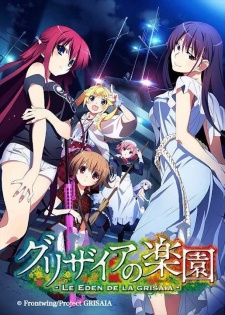
In the followup to the acclaimed Le Fruit de la Grisaia we see a boy’s unwilling loss of innocence as he is forced into the role of a killer who never had a chance to truly live and wants nothing more than to die. He stands alone; those around him enter his life through happenstance and leave it through death, and yet he patiently waits his turn to finally lay down his guns and join his friends in the afterlife—nothing more could be said about his search for Eden. But Eden is not in death, but in life, as the ones closest to him come together to free him, first from the physical imprisonment the government imposes as his past mentor comes back to terrorize Japan, and then from the mental imprisonment of having to face his inhuman past, not allowing himself to live in the same happy world as his friends. They teach him that he has a place to come back to, where his past is irrelevant and the present is one they sculpt together alone, leaving the whole world to worry about the future.
Now let’s break down each part of that closely. We finally see the detailed mysterious backstory of Kazami Yuuji, who was overshadowed in his family by his brilliant older sister, who eventually becomes an unparalleled tool for assassination and pleasure at the hands of the sadistic Oslo, and who finds respite in Asako, the military woman he calls “master”, although “sarcastic mother who trains him to shoot and has sex with him” also works. The emotions at play are real; we feel Yuuji slowly breaking mentally, and trauma at the sight of death grabs hold of his life, even as he seems to stabilize and find joy in life. When he joins the military, he has the greatest sharpshooting skills of his entire class, but vomits when his bullets hit even the wildlife in the woods. His friend dies in an accident off-screen and we feel upset; his master dies on screen and we are close to crying.
The present comes back, with Yuuji imprisoned for suspected domestic terrorism as the girls who have been recuperating their trauma at Mihama Academy in the first season leave their cocoon and go into the world, determined to fight to free the love of their lives. And this is the attitude that sets the tone for the rest of the show: a host of girls with no meaning in their lives other than making Yuuji happy, and going along with his every whim. The rescue is done in a heist style, with financial planning from the ground up and attending to minute details for each individual girl to perform in order for their master plan to successfully baffle both a secret government agency and a terrorist organization. This would all be heartwarming if it were slightly less angled at their complete emotional dependence on Yuuji, who then throws all their efforts away and resets the show to the start of the season just to satisfy his ego, completely nullifying their place in the show under the pretense of a plot point. If they had abridged the show to the first four episodes for backstory and the last episode for wrapping things up, they would only have to cut two minutes off the end of the show for it to make perfect sense. One less heist, but a lot more dignity.
Having friends as a replacement for a tortured existence of longing for death, I can buy, and that is symmetric between the girls and Yuuji. But if trauma were as much of a cause of emotional dependence as the girls of Le Eden de la Grisaia would have us believe, then it’s a wonder that Yuuji can even leave the school to take his morning run, let alone to apply for promotion in the military organization that gives him the assignments he seems to be desperately trying to consign to the past. There isn’t an ounce of development for the other characters, and their every action either purports their everlasting love or their usefulness as comedic tools—when the panty shots come it becomes pretty obvious that the writers have no particular love for their female cast. The action is prevalent and fun to watch, and I doubt a visual novel could convey the same sense of thrilling tension. The writing and backstory would have worked well in any format. But for everything else, from the comedy to the side characters we are to believe he loves so much, it would have been nice for it all to have remained consigned to porn and text boxes.